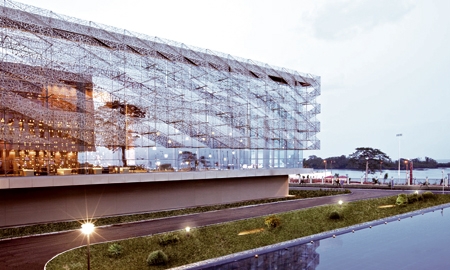Equatorial Guinea’s unprecedented economic boom and expectations of future growth have given rise to a prospering banking industry and the development of a sustainable financial sector.
Thanks in large part to hydrocarbon production, ongoing since 1992, this western African nation is forecasted to see a 6.3% rise in its GDP this year with continued growth until at least 2015. Moreover, Equatorial Guinea currently exports four times as much as it imports.
This new wealth is driving the government to further develop the infrastructure of the country with its Horizon 2020 initiative, aiming to further diversify the economy and reduce national poverty. This has resulted in a boom in the construction sector in Equatorial Guinea with significant improvements in infrastructure seen as the base for the rest of the industries in the country.
“Through the Horizon 2020 plan, the government is one of the principal economic engines, because of the projects they are promoting and the contracts they are signing with both the national and intentional private sector,” says Fernando Gomez Pastor, Managing Director of the National Bank of Equatorial Guinea (
BANGE), one of the main banks in the country.
FDI has been facilitated since Equatorial Guinea joined
the Economic Community of Central African States (ECCAS)
in 1985. Equatorial Guinea’s government, recognizing the limitations of the oil industry, is stimulating a diversified economy. |
The development of infrastructure has been central to these government projects, especially schools, hospitals, highways and ports. According to the Ministry of Economy having these modern resources is essential for attracting possible foreign direct investment (FDI).
The United States is the currently the number one foreign investor in Equatorial Guinea, especially within the hydrocarbon industry. While drilling began in the Aseng field in late 2011, newer fields such as the Alen field are scheduled to start production at the end of 2013.
With a strengthening relationship with the United States, the government hopes that American companies will begin to take an interest in other developing sectors and participate in social projects. Other major world economies such as Russia and China are also increasingly taking advantage of the investment opportunities in the African nation. The government hopes to attract long-term investors.
Moreover, FDI has been facilitated because of Equatorial Guinea’s admittance to the Economic Community of Central African States (ECCAS) in 1985, which allowed the country to adopt the CFA franc, a convertible currency, making for an easier exchange to the euro and dollar.
Additionally, Equatorial Guinea has some of the most favorable investment regulations in the region for foreign companies. However, the government recognizes the need to improve access to the country for foreign investors.
The country’s most popular bank,
CCEI, offers resources for easy and fast international transfers for investors. In fact, the government, along with the banks, has been an integral component of the development of a more modern banking system, setting up a network of ATMs and establishing the necessary technology to use Visa and MasterCard instead of cash. The country’s financial establishments are also currently setting up online banking.
These improvements in the banking sector aid the progress and establishment of small and medium-sized enterprises (SMEs), a driving force of the local economy. The increasing wealth of the country means more credit is available to finance SMEs, with 76% coming from
CCEI, which provides both the funding and economic advice.
The government is additionally fostering the development of local SMEs through an initiative to create a fund that will act as insurance for entrepreneurs investing in sustainable business.
Stimulating a diversified economy is an important goal for Equatorial Guinea’s government, which recognizes the limitations of the oil industry. Whereas before 1992, cocoa and wood were the leading exports in the country, the government also wants to emphasize developing its service sector and sees potential in its budding tourism industry.
The United Nations has likewise been supporting the government by doing an analysis of the diversification and industrialization of the economy in the subsequent years. The Ministry of Economy welcomes the expertise of the organization, appreciating the knowledge they provide regarding economic practices toward a more sustainable economy.
Additionally, due to Equatorial Guinea’s strategic location along the Atlantic coast and an increase in modern infrastructure, the country has the potential to become a logistical hub for the region.
Furthermore, this African region itself holds potential for trade among the Central African Economic and Monetary Community (CEMAC) member countries, such as Cameroon and Chad, among others. The participant nations in CEMAC enjoy free movement of capital and share a common currency.
According to a study called “Doing Business,” Equatorial Guinea is the country among those in the CEMAC that has the best data.

0 COMMENTS